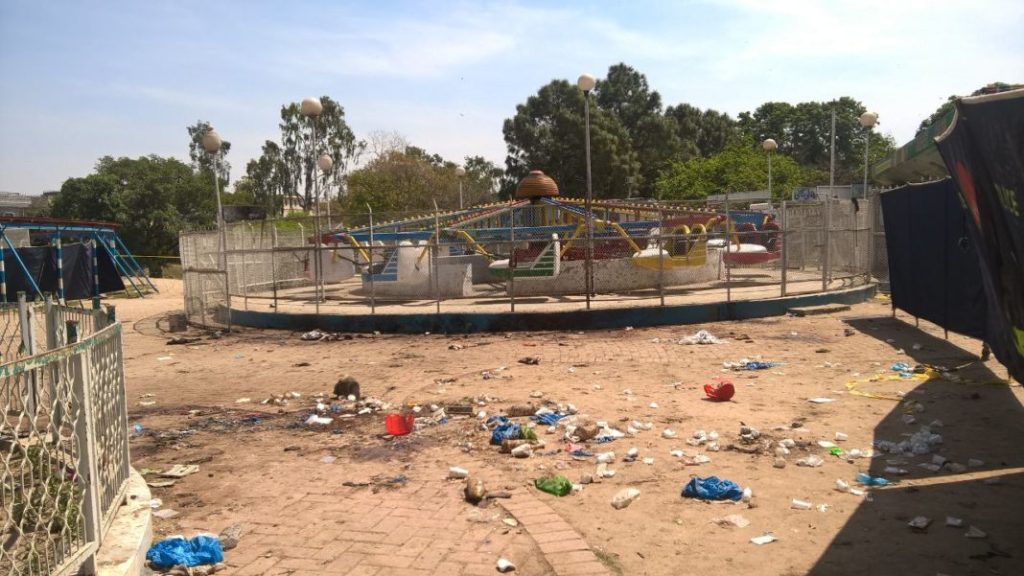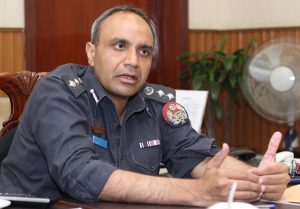Lahore: As many as 67 persons, including children, women and men are rehabilitating in the Jinnah Hospital Lahore from what has been one of the worst terror attacks in Lahore on March 27, 2016.
So far, 72 people have died in the suicide bombing that rocked Lahore’s crowded Gulshan e Iqbal park, situated in one of the city’s most populated and congested locality, Allama Iqbal Town.

According to the Additional Medical Superintendent Administration, Jinnah Hospital, Habib ur Rehman, 122 injured people were admitted to the hospital. Some of them had been discharged after treatment. In total, over 340 persons were injured in the bombing.
Nine people said Rehman were in a critical situation. While 14 children, 30 men and 23 women were still recovering from their injuries.
Relating the incident to News Lens Pakistan during its visit to the hospital, Zubair Ahmed, uncle of a 10-year-old victim, Rohail Abbass, who has been severely injured in the blast, said that Abbas had lost one brother who stuck in the blades of the swing he was playing at.
“My cousin had taken his four children to the park for an outing. He has lost one son. Surprisingly his other two kids remained unscathed though they all were standing near the playing area where the explosion occurred,” said Zubair.
Experts believe that the attacker had been smart enough to choose not only Sunday when recreational parks witness unusual crowd but also Easter for the day to attack. It had a double impact.
Jamaat-ur-Ahrar, a splinter group of Tehreek-e-Taliban Pakistan, has claimed responsibility for the attack. The JuA spokesperson, Ehsanullah Ehsan has claimed that the target were Christians.
The government, however, refused to own this assertion.
According to the official data, 10 Christians died while most of those who succumbed to this deadly attack were Muslims.
In a conversation with News Lens Pakistan, at the home of Wasabi, one of the deceased of the blast, at Youhanabad Lahore, a Muslim League (N) Christian Member of Punjab Assembly (MPA), Shakeel Ivan refused to acknowledge that only 10 Christians have died in the blast. He said that eight dead people only belonged to Youhanabad. He said that according to his estimate at least 30 Christians died so far.
A Muslim majority country Pakistan has a Christian population of more than two million.

In an interview, at his office, with News Lens Pakistan, the Deputy Inspector General Operations, Lahore, Dr Haider Ashraf, refused to accept that the attack was the result of security lapse.
He said that the police, stretched of resources, were not responsible for providing security to parks as well. The government, he said, had to look for other means to combat the diverse waves of terrorism.
“I believe private security arrangements should become a norm rather than an exception in the present situation,” said Ashraf.
Ashraf was candid in putting bare the facts regarding police’s ability to manage law and order with the available workforce.
Mohammad Nadeem Butt, Inspector Establishment, on the instruction of the DIG Operations, told News Lens Pakistan that currently 25,000 police officials were deployed in Lahore. The force, Butt said, had been divided into four departments: Police stations, investigation, patrolling and security.
“Even if we make a rough calculation, and assume that the population of Lahore is somewhere around, 10.25 million, there is one constable to guard approximately 5,000 citizens. While according to the international laws there should be one constable overlooking 50 citizens,” said Butt in a telephonic conversation with News Lens Pakistan at the DIG office.
Within a few hours of the attack, the government of Punjab requisitioned army in Lahore for deployment at the crime scene.
Eyebrows were raised at the request, bringing into question the ability and capacity of the police to handle terrorism-related incidents even when the country has been plagued of this curse for decades now.
DIG operation, Ashraf said, “The army has been called in the line of the National Action Plan (NAP). It is mentioned in the NAP that the law enforcement agencies of the country would together handle terror-related incidents. It does not reflect the incapacity of the police.”
The Punjab government, taking strong exception of the attack, so far being viewed the worst since the Army Public School massacre that killed 134 school children in December 2014, have launched an intelligence-led operation in Punjab in close coordination with the paramilitary troops of the armed forces.
For months, the government of Punjab is being grilled for not launching an operation in Punjab where it was alleged that an extensive network of terrorists’ sympathizers, financers and supporters exist.
Rana Sanaullah, the Punjab Law Minister, in a press conference on March 29, however, negated having any militant groups or safe havens in Punjab.
Hassan Askari, a defense and security analyst, deplored the government and police’s response to the Gulshan Park incident.
Talking to News Lens Pakistan on a telephone, he said, “This is not the first incident of terrorism that has occurred in Lahore or Pakistan; the government has been shy of owning the nefarious activities of the right-wing Islamist groups.” The government has never named any religious organization that needs condemnation, he added.
Askari said, “In his speech to the nation, after the attack, Prime Minister, Nawaz Sharif, has sympathized with the victims saying he would not let the blood of the innocent go wasted. However, the PM had failed to give any policy outline. What next? We do not know.”
He said the attack is government’s failure. Despite all the denials of the government, it’s a reality that army made the final decision to launch the operation in Punjab.
Askari refused to accept that the military had been called to aid the police in the Gulshan Park incident, under the NAP. He questioned as to how many times the provincial government had called the army to handle terror-related incidents in the province.
It is, said Askari, an army led and army owned operation. It is, he further said, is a question mark on the ability of the government to make difficult decisions, especially when it comes to the religious organization from where the government draws implicit electoral support.
Talking about dwarf leadership, Mubasher Bukhari, senior analyst, said when the TTP had threatened that children would be their next target then why the government did not take into account all those places where children are found in large numbers. In most of the schools, he explained, parents are persuaded to take their kids to parks at least once a week.
“This is precisely what is called vision; seeing beyond time and space, something our leaders lack severely,” said Bukhari.



